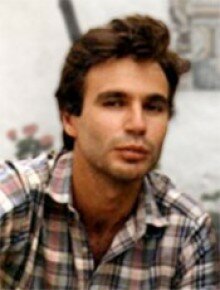
Luís Miguel Nava, who published the bulk of his work in the 1980s, was perhaps the strongest and most original Portuguese poet to come to light in that decade. Brutally assassinated in Brussels, in May of 1995, when just 37 years old, Nava published his first book – which he soon renounced – when still an adolescent. This was followed, in 1979, by Películas (Films), which won the prize for emerging poets from the Portuguese Writers’ Association.
After earning a degree in Romance Languages and Literatures, he worked as a university professor in Lisbon and at Oxford. From 1986 onwards he lived in Brussels, working as a translator for what was then called the European Community Council.
His last will and testament provided for the creation of a Luís Miguel Nava Foundation, which was to publish a magazine and award a poetry prize, directives that have been faithfully carried out.
The fact he was careful to draft a will at thirty-some years of age and even the way his poetry evolved – his friend the poet Gastão Cruz aptly classified Nava’s last book, Vulcão (Volcano) (1994), as “a veritable Office of Tenebrae” – strongly suggest that the poet had a presentiment that he would not live a long life.
His work, and in particular his last three books, lead us into one of the strangest and most inhospitable worlds ever forged by Portuguese words. In Nava’s universe, which seems to be ruled by a hallucinatory synesthesia, everything interpenetrates and is fused together, or so it feels. And this ‘everything’ includes the body in all its aspects, from the skin (or even the clothing that covers it) to the innermost viscera; everyday objects; landscapes, ocean and sky; past, present and future; and memory, which in Nava’s writing also takes the form of a tangible object, endowed with physical properties. This generalised porosity of things, which allows everything to communicate with everything else, presupposes a universe not governed by the laws of classical physics, but also implies a literal materialisation of sensations.
As his poetry moves inexorably towards chaos and darkness, the properties of the body that sustain this world change accordingly. In Rebentação (Breaking) (1984), everything is still elastic and adhesive, with all the parts of the body in communication with each other and with the world. But in the last two books, as if that elasticity had been taken so far it finally snapped, the body is fragmented and divided, to the point of the poet describing it as a row of bones driven like stakes into the desert.
Poetry
Películas, Moraes, Lisbon, 1979
A Inércia da Deserção, & etc., Lisbon, 1981.
Como Alguém Disse, Contexto, Lisbon, 1982
Rebentação, & etc., Lisbon, 1984
O Céu sob as Entranhas, Limiar, Oporto, 1989
Vulcão, Quetzal, Lisbon, 1994
Poesia completa: 1979–1994, Dom Quixote, Lisbon, 2002
Essays
O Pão a Culpa a Escrita, Imprensa Nacional-Casa da Moeda, Lisbon, 1982
Poesia de Rodrigues Lobo, Comunicação, Lisbon, 1985
O Essencial sobre Eugénio de Andrade, Imprensa Nacional-Casa da Moeda, Lisbon, 1987
Anthologie de poésie portugaise: 1960-1990, Leuvense Schrijversaktie, Leuven, 1991. Tr. Marie Claire Vromans
Ensaios reunidos, Assírio e Alvim, Lisbon, 2004
In French
Volcan, Eulina Carvalho, Paris, 2000. Tr. Marie Claire Vromans
Links (in Portuguese)
Luís Miguel Nava Foundation
Essays on Nava’s poetry:
www.jornaldepoesia.jor.br
www2.dlc.ua.pt
www.uefs.br

